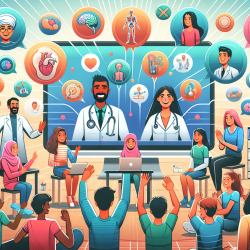Enhancing Practitioner Skills: The Imperative of LGBTQI Health Competency
In recent years, the medical community has increasingly recognized the unique health disparities faced by LGBTQI individuals. Despite this awareness, many medical schools have been slow to integrate comprehensive LGBTQI health education into their curricula. A groundbreaking study, "Queering Medical Education: Systematically Assessing LGBTQI Health Competency and Implementing Reform," sheds light on this critical issue and offers a replicable model for curriculum reform.
Understanding the Gap
The study conducted by DeVita et al. (2018) at Georgetown University School of Medicine reveals significant gaps in medical education concerning LGBTQI health. It highlights that American medical schools, on average, dedicate only five hours to LGBTQI health topics, leaving future healthcare providers ill-prepared to meet the needs of LGBTQI patients. This deficiency contributes to ongoing health disparities and can lead to negative experiences for LGBTQI individuals in healthcare settings.
The Georgetown Model: A Blueprint for Reform
Georgetown University School of Medicine developed a systematic approach to assess and reform its preclinical curriculum. The process involved auditing video lecture captures to identify existing LGBTQI content and comparing it against nationally established competencies from the American Association of Medical Colleges (AAMC) and Vanderbilt University.
The audit revealed that Georgetown's curriculum fully met only seven out of 30 AAMC competencies, partially met eight, and failed to meet 15. These findings underscore the need for targeted curricular reforms to ensure comprehensive LGBTQI health education.
Implementing Change
Based on the audit results, Georgetown developed a targeted curriculum reform plan. This included creating educational content specifically designed to address the unmet and partially met competencies. The reform emphasized integrating LGBTQI health topics into existing courses rather than treating them as separate or supplementary subjects. This approach normalizes LGBTQI health education and ensures it receives equal attention as other health disparities.
Georgetown's reform model serves as a blueprint for other medical schools seeking to enhance their LGBTQI health education. By adopting similar methods, schools can systematically assess their curricula, identify gaps, and implement targeted reforms to better prepare future healthcare providers.
Why Practitioners Should Care
For practitioners, understanding and addressing the unique health needs of LGBTQI patients is not just a matter of competency but also of providing equitable and compassionate care. By staying informed about the latest research and reform models, practitioners can advocate for and contribute to meaningful changes in medical education. This, in turn, will improve the healthcare experiences and outcomes for LGBTQI individuals.
Encouraging Further Research
Practitioners are encouraged to delve deeper into this topic by reading the full research paper. Understanding the systematic methods used to assess and reform medical curricula can inspire further research and innovation in LGBTQI health education.
To read the original research paper, please follow this link: Queering medical education: systematically assessing LGBTQI health competency and implementing reform.










